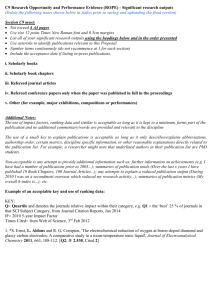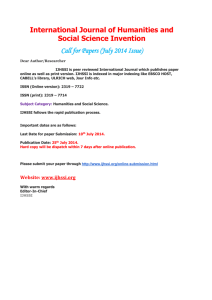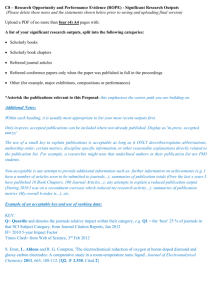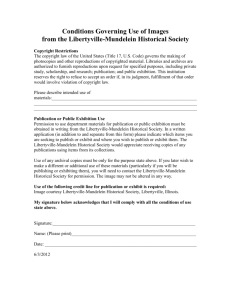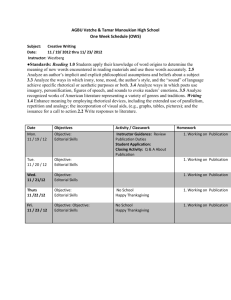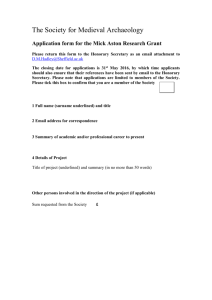An introduction to the model - a concise paper to
advertisement
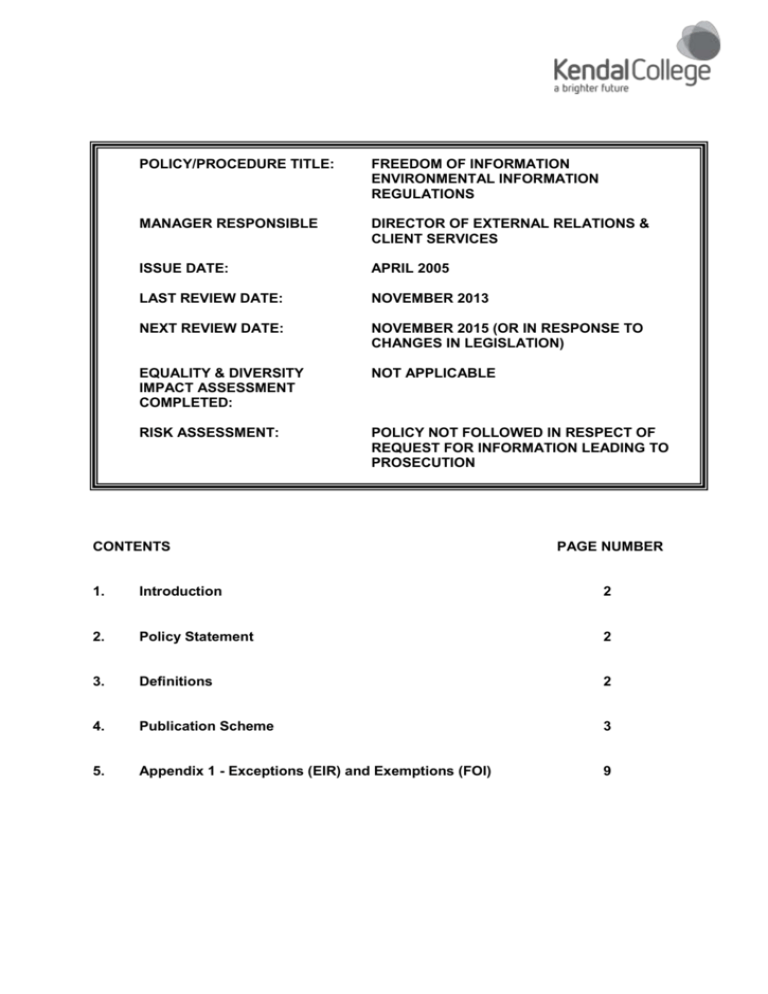
POLICY/PROCEDURE TITLE: FREEDOM OF INFORMATION ENVIRONMENTAL INFORMATION REGULATIONS MANAGER RESPONSIBLE DIRECTOR OF EXTERNAL RELATIONS & CLIENT SERVICES ISSUE DATE: APRIL 2005 LAST REVIEW DATE: NOVEMBER 2013 NEXT REVIEW DATE: NOVEMBER 2015 (OR IN RESPONSE TO CHANGES IN LEGISLATION) EQUALITY & DIVERSITY IMPACT ASSESSMENT COMPLETED: NOT APPLICABLE RISK ASSESSMENT: POLICY NOT FOLLOWED IN RESPECT OF REQUEST FOR INFORMATION LEADING TO PROSECUTION CONTENTS PAGE NUMBER 1. Introduction 2 2. Policy Statement 2 3. Definitions 2 4. Publication Scheme 3 5. Appendix 1 - Exceptions (EIR) and Exemptions (FOI) 9 1. Introduction Kendal College is committed to responding to and providing information in line with the Freedom of Information Act 2000 (FOI) and the Environmental Information Regulations (EIR). The College has adopted a model publication scheme approved by the Information Commissioner for Further Education colleges. Both FOI and EIR promote greater openness and accountability across the public sector by requiring all ‘public authorities’ to make information available proactively, through a publication scheme (see 4 below). EIR gives the general public a right to environmental information held by the college. 2. Policy Statement The College will comply with the legislation and give people the general right to see information held by the college as identified within its publication scheme. The college is also committed to providing transparency and where the information is available will provide the public, if required, with information regarding decision making and how it spends public money. Information requests that fall outside the publication scheme will be subject to the exceptions and exemptions of both the FOI and EIR (Appendix 1). 3. Definitions Public Authorities Are public-sector bodies and include central government, local authorities, police authorities, the health service, schools, colleges and universities. The Act also covers information held by other organisations on behalf of public authorities Recorded Information Includes information held on paper, on computer and on audio and video tapes The Information Commissioner The Information Commissioner’s office is an independent body that reports to Parliament. They monitor the Data Protection Act 1998 and the Freedom of Information Act 2000, and makes sure that organisations fulfil their legal responsibilities under the Acts by approving all publication scheme. Publication Scheme A publication scheme is a document which describes the information a public authority publishes, or intends to publish. In this context, ‘publish’ means to make information available, routinely. These descriptions are called ‘classes of information’. The scheme is not a list of the actual publications, because this will change as new material is published or existing material revised. It is, however, the public authority’s commitment to make available the information described. The scheme must set out the classes or categories of information published and make clear how the information can be accessed and whether there is a charge. Information Request Requests for information that can easily be provided should be treated as “business as usual”. If any information requested is held and needs to be actively considered then the request should be formally treated as a request for information. If it seems likely that the requested information cannot be disclosed, it should be formally recorded as a request for information. 2 4. Publication Scheme 4.1 Legal Requirement As a minimum, the legal requirement is for the college to make available information that is required by statute or by virtue of a funding agreement, financial memorandum or other agreement. 4.2 4.3 Accessing information covered by the publication scheme 4.2.1 The classes of information published by the College are included in Section 4 second part of the scheme. The types of information and documents listed in the classes are examples only and are not meant to be definitive. The purpose of the examples is to indicate the type of information that should be made available, if held, via the Model Publication Scheme (MPS). 4.2.2 All information identified in the list will be made available as hard copy or in electronic format where this is available. A nominal charge of 10p per sheet will be charged for printed materials. 4.2.3 To request information available through the College’s publication scheme, please contact: Carole Drury (Publication Scheme Co-ordinator), Clerk to the Corporation, Kendal College, Milnthorpe Road, Kendal, LA9 5AY, email: carole.drury@kendal.ac.uk 4.2.4 The publication scheme relates to ‘published’ information. Therefore, material covered in the scheme has already been prepared in a format ready for distribution. 4.2.5 Requests for information that do not specifically mention Freedom of Information or Environmental Information Regulations but which need to be actively considered as such will fall within the scope of this policy. 4.2.6 The college is not expected to routinely publish all information and the scheme provides a list of the type of information we can provide. We are not expected to make the information available if we do not hold the information already. What about information not covered by the publication scheme? 4.3.1 From 1st January 2005, members of the public have the right, under the Freedom of Information Act 2000 and Environmental Information Regulations, to request any information held by a public authority which it has not already made available through its publication scheme. 4.3.2 Requests have to be made in writing and the College will respond within 20 working days. All requests will be forwarded to the Publication Scheme Co-ordinator as above for response. Requests will be processed without any charge unless the costs involved exceed £450 where a fee, in line with the Fees Regulations will be charged to cover the time taken in identifying, retrieving or searching for the requested information where . Where the costs associated with the search exceed this figure, there is no requirement to proceed with the request and the applicant will be offered assistance in narrowing the search. Under EIR, there is no cost limit for dealing with requests but requests can be refused where they are manifestly unreasonable, subject to a public interest test. 3 The College will not be required to release information to which an exemption in FOI or exception within EIR legitimately apply. This would include but will not be limited to information covered by the Data Protection Policy and in particular relates to personal information. However, we will explain to the applicant why we are not releasing information and if necessary will justify this to the Information Commissioner. 4.4 4.3.3 Whenever possible, documents that are exempt will be marked as such at source eg: Corporation meeting papers, to speed up response to FOI requests. 4.3.4 A list of exemptions is appended. Recording of requests made under the legislation The Publication Scheme Co-ordinator will retain a log of all information requested and released under the legislation. These records will be retained and disposed of in line with the College Data Protection Policy. In line with Education Funding Agency (EFA) Part 2 clause 8 of the Conditions of Funding Agreement, there is a requirement that any request for information and the College’s response in respect of the funding agreement or services provided through that funding with the College or any of its subcontractors shall be reported to the EFA within 28 days of the request. All responses must comply with the obligations of the Data Protection Act 1998. EFA are responsible for determining whether the information requested is exempt from disclosure. An annual report on FoI requests is provided to the Corporation. 4.5 Feedback 4.5.1 It is important that this publication scheme meets the needs of users. If users find the scheme difficult to understand, they should advise the College accordingly. The scheme can also be made available in alternative format. The College also welcomes suggestions as to how the scheme might be improved. Any questions, comments or complaints about this scheme should be sent in writing to Carole Drury, the Publication Scheme Co-ordinator at Kendal College 4.5.2 If users are not satisfied with the outcome of application, they have the right to appeal to the College who will review the application. If we are unable to resolve any complaint, the user can complain to the Information Commissioner, the independent body who oversees the Freedom of Information Act: Information Commissioner Wycliffe House Water Lane Wilmslow Cheshire SK9 5AF 4.6 Further Information More information about the Freedom of Information Act is available on the Information Commissioner’s website at: www.informationcommissioner.gov.uk Further information about Environmental Information Regulations is available on the following website: www.defra.gov.uk 4 4.7 Freedom of Information Act 2000 Schedule The main groups of classes of information in the Kendal College model publication scheme are: Who we are and what we do Financial Resources – what we spend and how we spend it College Priorities and how we are doing Policies and procedures Lists and registers Services offered Who we are and what we do This section covers information about the college, its structures, locations and contacts, relating to the way the institution is governed and how decisions are made. It includes information on the legal status of the institution. In some instances information from minutes will be exempt from disclosure where it contains personal information, information that may damage the commercial interests of the institution or that may threaten the health and safety of specific individuals. Class Legal Framework How the institution is organised Information on the institutional context Management Structure Student Activities Description Instrument & Articles of Government Location and contact details Organisational structure charts together with description of the work of each unit and the names and responsibilities of key personnel Strategic Plan Disaster Recovery Plan Development Plan Corporation Membership list Code of Conduct for Governors Kendal College Standing Orders Procedure for complaints against the Corporation Whistleblowing Policy/Procedure Committee Terms of Reference Minutes and papers for Board and committees unless determined to be exempt Senior Leadership & Management Team minutes unless determined to be exempt List of and information relating to organisations we work in partnership with Information relating to the operation and activities of student structures (Student Council) Financial Resources This section covers information on the institution’s strategy and management of financial resources. The Finance Department provides accounting, procurement and contracting services, helping to make best use of resources and fulfilling statutory responsibilities. Information that may damage the institution’s commercial interests will be excluded from publication. There is an expectation that financial information for the current and previous two financial years should be available. 5 Class Finance Resource Planning Funding and Income Description Monthly Management Accounts Annual Statement of Accounts Revenue budgets and capital expenditure Details of expenditure over £15,000 including costs, supplier and transaction information Financial audit reports Capital programme Pay policy Staff pay and grading structures including senior staff with a basic actual salary of at least £60,000. More junior posts should be identified by salary range Disaster Recovery Plan Staff allowances and expenses that can be claimed including total of allowances paid to senior staff as above Governors’ allowances Register of suppliers Procurement and tender procedures and reports Contracts – of sufficient size to have gone through tendering processes Financial Procedures Financial Regulations Policy/Procedure Credit Card Policy/Procedure Payroll Procedures Investment Policy/Procedure Sources of funding and income – grants, tuition fees, income generation schemes What are our priorities and how are we doing This section covers information on the institution’s strategy and management Information in this section should be available at least for the current and previous three years Class College decision making External Review information Corporate relations Government and regulatory reports Description Annual report Self assessment report Strategic plan Teaching and learning strategies Academic quality and standards reports (SAR) Ofsted inspection report Minutes, agendas and papers from governing body Minutes, agenda and papers from directors, SLMT and CMT meetings Annual monitoring and review process Roles of different bodies Programme review and approval Links with employers Sponsorship deals Accreditation and monitoring reports by professional, statutory or regulatory bodies Policies and Procedures Current written protocols, policies and procedures for delivering services and responsibilities Class Conducting college business Description Codes of practice Memorandum of understanding Standing orders Handling requests for information 6 Class Academic services Student Services Human Resources Governance Equality & Diversity Health and safety Estates management Complaints Records management Charging policies Description Student assessment Course set up Appeal procedures Admissions and enrolment policy Student records systems Student complaints and appeals policy Student support services Student disciplinary policy Full range of HR policies Terms and conditions of employment Consultation with unions Grievance and disciplinary policies Public interest disclosure policy Staff development policy Recruitment and current vacancies Code of conduct Equality policy and equality scheme Policy statement Disposals policy Estates strategy and plan Facilities management policies Grounds and building maintenance policy Complaints procedure Requests for information Operating the publication scheme Information security policies Records retention and archiving policy Data protection (including data sharing) Fees policy Statutory charging policies Lists and Registers This section contains information on information contained only in currently maintained lists and registers Class Registers CCTV Disclosure logs Register of Interests Description Seal register Asset register – location of public land and buildings Information asset register Locations of overt CCTV surveillance cameras Logs of FoI requests Governance interests Senior staff declaration of interests Gifts and hospitality provided to senior staff Services Offered This section covers those functions within the institution that provide access to information to the student body and both teaching and support staff. These include leaflets, guidance and newsletters. Class general information Description prospectus and course content services for outside bodies health and welfare services and careers advice funding for students eg learner support fund services for which the college can collect a fee sport and recreational facilities music, art and cultural activities museums, libraries, special collections and archives 7 conference facilities advice and guidance media releases 4.8 Environmental Information Regulations EIR requests cover the following key areas 5. The state of elements of the environment – air, atmosphere, soil, land, landscape and the natural site and the interaction between these elements Substances, energy, noise, radiation, waste affecting the environment Policies, legislation, plans, agreements and activities affecting or protecting elements of the environment Reports on the implementation of environmental legislation Cost benefits and economic analyses and assumptions State of human health and safety, including contamination of the food chain, conditions of human life, cultural sites or built structures affected by elements of the environment Appendix 1 Exceptions (EIR) and Exemptions (FOI) 8 Appendix 1 Exceptions (EIR) and Exemptions (FOI) In order to withhold information, it is necessary to cite an exemption or exception in accordance with the legislation. Under FOI it is possible to refuse a request on the following grounds: The cost of compliance exceeds the limit set in the fees regulations The request is vexatious or repeated Absolute Exemptions under Freedom of Information Information is reasonably accessible by other means (s.21) Information supplied by, or relating to, bodies dealing with security matters (s.23) Court records (s.32) and parliamentary privilege (s.34) Personal information (s.40) Information provided in confidence (s.41) Prohibitions on disclosure (s.44) Qualified Exemptions subject to public interest test Information intended for future publication (s.22) Investigations and proceedings (s.30) Audit functions (s.33) Health and safety (s.38) Environmental information (s.39) Commercial interests (s.43) EIR Exceptions subject to public interest test Does not hold that information when request received (reg 12(4)a) Is manifestly unreasonable (reg 12(4)b) Is formulated in too general a manner (provide assistance in re-framing the request) (reg 12 (4)c) Relates to unfinished documents or incomplete data (reg 12(4)d) Would involve disclosure of internal communications (reg 12(4)e) And if the disclosure would adversely affect: The course of a disciplinary inquiry (reg 12(5)b Interests of the person who provided the information (reg 12(5)f) unless on emissions Protection of the environment (reg 12(5)g) unless on emissions Personal data (reg 13) 9
